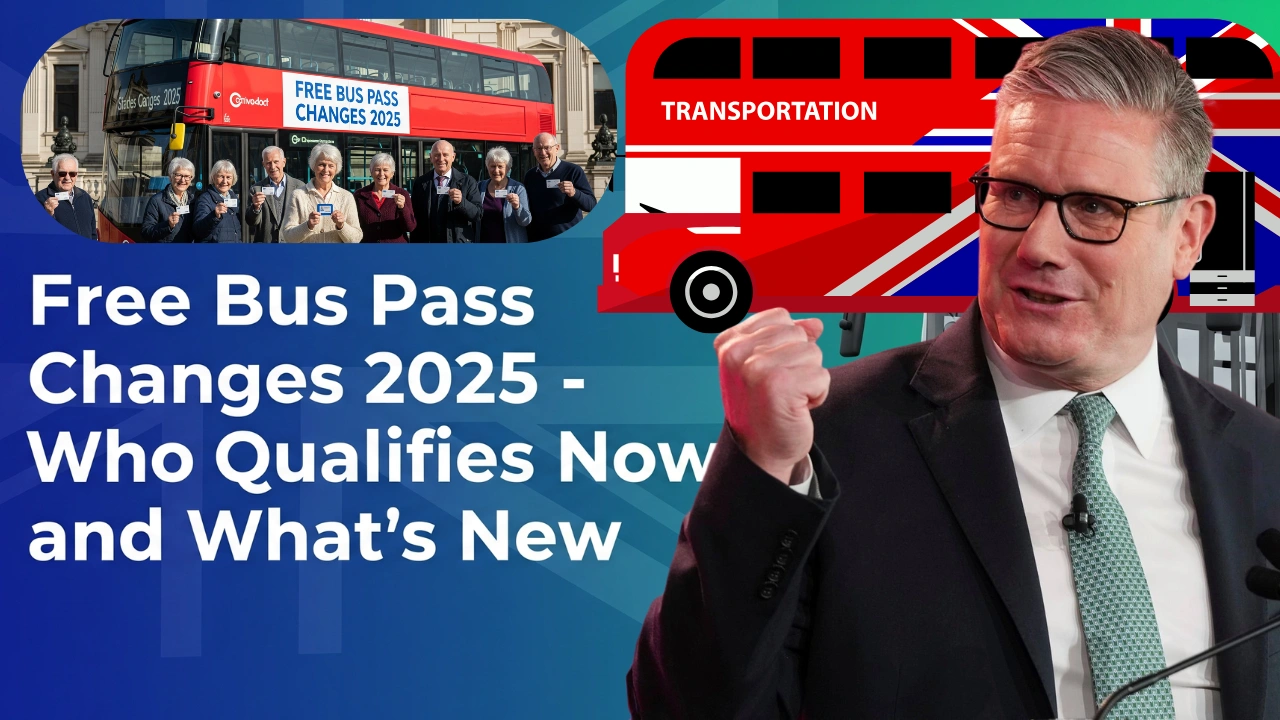The government has unveiled updates to free bus pass changes 2025, with important implications for older adults, rural travelers, and under-22s navigating escalating transport costs and limited service access.
Background & Context: Why This Matters Now
Inflation and higher living costs have put pressure on families across the UK. Public transport, especially buses, remains a lifeline—yet access has declined in many areas. Since 2009, bus usage has dropped by around 20%, and routes outside cities have fallen by 18%, leaving many communities stranded in “transport deserts”.
The free bus pass changes 2025, particularly for under-22s and pensioners, aim to ease travel burdens and create equity in access across generations.
Who Will Benefit from the Changes?
-
Under-22s in England: MPs are recommending extending free daily bus travel to all under-22s, especially in rural areas, improving access to work and training.
-
Pensioners Aged 60–66 (Outside London): Currently, free travel begins at state pension age (66). A petition with over 100,000 signatures calls for parity with Scotland and Wales, where eligibility starts at age 60.
-
Cambridgeshire & Peterborough Concessionaries: From April 1, 2025, local bus pass holders enjoy all-day free travel, beyond off-peak restrictions.
Why the Government Is Making These Changes
-
Boosting Equity and Opportunity: Free travel offers youth and seniors access to jobs, education, and services without financial barriers.
-
Combatting Isolation: Rural towns hit by vanished routes need inclusive transport solutions.
-
Redirecting Investment: The government’s £1bn bus funding and extended fare caps reflect a broader effort to keep buses viable.
-
Responding to Public Pressure: Campaigners and petitions have pushed hard for fair travel entitlement across regions.
How the Updated System Will Work
Coverage Update Table – 2025 Changes
| Group | Current Eligibility | New/Proposed Change |
|---|---|---|
| Under-22s (England) | Limited youth schemes, varies by region | Proposal: Full free travel across England, similar to Scotland |
| Adults 60–65 outside London | No entitlement until age 66 | Local councils may offer early access, urged nationally |
| Cambridgeshire & Peterborough | Off-peak free travel | All-day free travel from April 1, 2025 (transport.cambridgeshirepeterborough-ca.gov.uk) |
| Scotland & Wales Pensioners | Free travel from age 60 | No change – remains a benchmark for equity |
| Disabled and seniors (UK-wide) | Eligible through ENCTS (England only) | Continues, but DWP rule changes may impact scope |
Political & Economic Considerations
-
The ENCTS costs around £700 million annually. Expanding age eligibility would require careful funding adjustments.
-
The Transport Committee highlights the need for long-term bus funding, rural weighting, and consistent connectivity standards.
-
Some critics argue for means testing or scaling back universal subsidies to reduce public spending, questioning fairness in funding.
Reactions from Stakeholders
-
Transport Committee (MPs): Advocate for expanded eligibility, particularly for under-22s.
-
Campaigners and Petitioners: Highlight our “unjust” disparity for 60-year-olds outside London.
-
Local Authorities (e.g., Cambridgeshire): Move forward with advanced local concession benefits.
-
Public Advocates (e.g., Scotland): Praise inclusive schemes like their National Entitlement Card, while warning about eligibility cuts due to DWP changes.
How to Apply or Make Use of the Scheme
-
Under-22s (if pilot approved): Likely via the National Concessionary Travel Scheme or local authority registration once legislation is passed.
-
Adults 60–65: Contact your local council to check for discretionary schemes.
-
Cambridgeshire & Peterborough: All-day travel will auto-enable on valid concessionary passes from April 1, no action needed.
-
Everyone: Always apply through the official GOV.UK bus pass application pages.
Possible Challenges Ahead
-
Funding Pressure: Extending free access nationally could strain already expensive subsidies.
-
Regional Variations: A patchwork of policies could create confusion for travellers across borders.
-
Implementation Delays: Pilots and council decisions may slow rollout.
-
Fraud Risk: New eligibility layers increase oversight needs.
Public Response & Sentiment
-
Many older adults and youth campaigners are optimistic, seeing potential for real travel equality.
-
However, some taxpayers and budget-focused voices question whether universal benefits remain sustainable.
What to Expect Next
-
Transport Committee Report: Likely to pressure DfT to launch a national pilot for under-22s.
-
Government Review: Potential expansion of discretionary powers for councils to fund early pensioner passes.
-
Campaign Watch: Growing public signatures could trigger parliamentary debate if 100,000 reached.
-
Local Implementation: Places like Cambridgeshire pave the way as models for wider adoption.
Free bus pass changes 2025 are reshaping who gets access to vital transport — from young people seeking opportunity to older adults facing mobility issues. The path ahead depends on political will, funding decisions, and public support.
